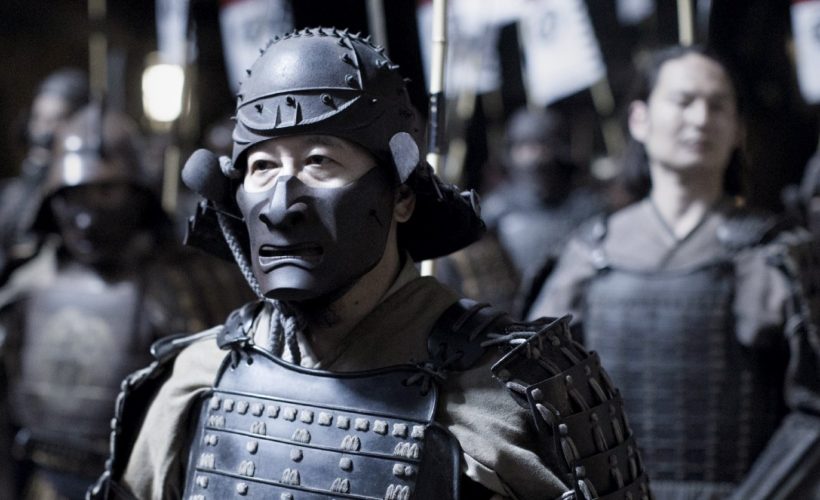There are many things that Westworld is. It is artful. Its scenes are sculpted with the same beauty and care that went into building the robots’ exquisite bodies. It explores with delicacy the adjacent modes of consciousness that accompany sophisticated artificial intelligence.
And then there are the things that Westworld is not. Warm, intimate, relatable, human? Nope, not lately. There is, for starters, the total absence of meaningful relationships. Both Dolores (Evan Rachel Wood) and Maeve (Thandie Newton) have doting lovers, sure, but their ardor has the nuance of an elementary school crush. Friendships? None. Familial bonds? Only deeply twisted ones. The most intimate moment of the season is in the show’s opening sequence, when an anonymous robo-mom tenderly holds her baby.
That emptiness weighs on the second season’s fifth episode, which centers on a side-quest into Shogun World, where Japanese clichés are prettily layered onto Westworld’s themes. Maeve, Hector (Rodrigo Santoro), and the others come across an Edo-era town that bears a striking resemblance to Sweetwater. As Armistice (Ingrid Berdal) watches a Japanese version of her and Hector shoot up the town, Lee Sizemore (Simon Quarterman) admits to cribbing from Westworld’s plot lines and characters when writing Shogun World. In this new park, Maeve and her minions are observers as much as actors, marveling at the sight of themselves brought to life in different bodies. The conceit has a philosophical, Westworld-appropriate ring to it. But the execution is hokey, with even Lee Sizemore rolling his eyes at the hosts’ fascination with their mirrored selves.
The group has stumbled off-course from Maeve’s hunt for her daughter, which remains their primary goal. We know that finding Maeve’s daughter is a Big Important Theme. We’re surely headed towards some mind-bending reveal when this daughter emerges at last. Yet it also remains another of Westworld‘s extremely shallow storylines. Viewers are told almost nothing about the gravity of this relationship, which is shown time and again as a snapshot memory of a beautiful child, a few seconds of extreme brutality, a glimpse of mother and daughter walking hand-in-hand through tall grasses, and little else. While we wait for Maeve to find her girl, we take on faith that her motherly instincts are a natural consequence of her inner life, and try to squish down worries that all this daughter business is just a transparent plot device to keep her marching around the parks.
This episode centers on a parallel tragedy involving Japanese Maeve, named Akane (Rinko Kikuchi), and the girl she thinks of as her daughter. An emissary for the Shogun visits the Japanese version of the Mariposa Saloon and orders Akane to hand over that daughter, a young geisha named Sakura. Akane refuses and kills the emissary. Japanese Hector urges them to flee before the wrath of the Shogun descends upon them—but first they inexplicably all decide to take a nap. While they’re resting, the Shogun’s ninjas swarm the place and deliver a beating to Maeve’s minions. But as one ninja slowly strangles Maeve, she taps into her host-controlling superpower. Her attacker suddenly releases her and drives a knife through his own skull. It’s not wit or grit that saves the day, but magic.
The show is in a tough moment. Its leading ladies, Maeve and Dolores, are flush with power. Maeve can escape any death threat by getting her mind in the right gear, and Dolores is ruthless, cunning, and granted various advantages through Ford’s machinations. They both travel with lab techs in tow, giving them backdoor access to their own code as needed. They traipse around with an air of superiority that seems ripe for a takedown, yet episode after episode they skate past obstacles.
In Shogun World, we get treated to not one but two displays of Maeve’s secret mind control skill. In a sad twist, she and her band of supporters go to visit the Shogun, who kills Sakura simply because he can. Akane manages to get close to him and saws his head off. That might seem like a dangerous move to pull within the Shogun’s own encampment, but don’t worry! Maeve can deactivate all the bad guys by casting her witchy spells.
Her mind control skill isn’t totally unbelievable, even if it is unsatisfying to watch. It’s possible Maeve has managed to access some wireless communication protocol that allows her to transmit data to the other hosts, effectively taking over their minds. But her adventures in Shogun World don’t explore the limits of that power, which could trigger self-reflection or self-doubt. These trials have no impact on her internal life.
Then there’s Dolores. Oh, Dolores. Let’s take a moment to mourn what she’s become so far in this season. She is cold, distant, calculating—flat. For someone who insists she’s discovering her true nature, she is unfazed by the two personalities jammed into her body. We’ve seen Evan Rachel Wood navigate the delicate shifts demanded of her character in other settings, switching deftly in and out of analysis mode, for example. But the avenging Dolores who dominates Season 2 is stuck in one emotionless mode. She’s more of an automaton now than she was before discovering her robot nature.
In this episode, she and Teddy (James Marsden) are back in Sweetwater. He urges her to give up her quest and start a new life with him. Somehow Teddy never questions his devotion to her, even though she shows no trace of the rancher’s daughter he was first programmed to love. Nor does he seem to notice that their chemistry has dipped below zero. After engaging in unwatchable sex, Dolores declares him unfit for their quest and orders the lab tech in her coterie to alter Teddy’s stats without his consent. With Teddy pinned and screaming, the lab tech maxes out his bulk apperception, aggression, and cruelty, among other bellicose traits, while erasing his likable attributes, such as empathy and imagination. She kills him from the inside as a matter of business.
With Dolores and Maeve both pursuing their single-minded quests, they fail to engage in any meaningful way with the people around them. But hang on, you say, Westworld is a show about getting to know one’s true self. The reason the characters come off as self-absorbed is that they finally have a self to call their own. Maybe so. But the good stuff emerges only when we turn our gazes outward, towards others. Let’s hope Westworld rediscovers that fundamental human truth, and gives its extraordinary robots more chances to love, learn, and lose.
More Great WIRED Stories
- CGI “influencers” like Lil Miquela are about to flood your feed
- Insect-borne diseases have tripled. Here’s why.
- Oculus Go review: Cordless VR is here and it’s pretty dope
- Yanny vs Laurel means we will all die alone
- That time when John Doerr brought a “gift” to Google’s founders
Source:WIRED











